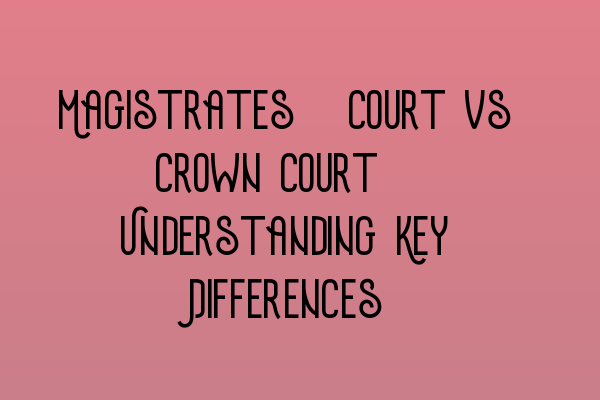Magistrates’ Court vs Crown Court: Understanding Key Differences
Welcome to the SQE Criminal Law & Practice Law UK blog! In this post, we will dive into the key differences between Magistrates’ Court and Crown Court. Whether you are studying for the SQE exams or just curious about the criminal justice system, this article will provide you with valuable insights.
Magistrates’ Court
Magistrates’ Court is the lower court in the England and Wales criminal justice system. It deals with less serious offenses, also known as summary offenses. These offenses can include minor criminal acts such as traffic violations, petty theft, and public disorder.
Magistrates’ Court is presided over by magistrates or justices of the peace, who are not legally qualified. Typically, there are three magistrates sitting in a panel to make decisions on cases. They evaluate the evidence presented and determine guilt or innocence.
One significant aspect of Magistrates’ Court is that it acts as a court of first instance. This means that most criminal cases start here. The court conducts preliminary hearings, bail applications, and decides whether to send more serious cases to the Crown Court for trial.
In Magistrates’ Court, the prosecution does not need to present a unanimous verdict. If two out of three magistrates agree on a guilty verdict, it will be considered as an overall guilty verdict.
Crown Court
Crown Court is the higher court in the criminal justice system. It deals with more serious offenses, including indictable offenses and cases sent from the Magistrates’ Court. Indictable offenses are more severe crimes, such as murder, rape, and robbery.
Crown Court has a judge as the presiding officer. The judge is qualified and legally trained to ensure fair trials and interpret the law accurately. In some cases, a jury is also present to hear the evidence and deliver a verdict.
Unlike Magistrates’ Court, Crown Court has the power to impose more severe sentences. If a defendant is found guilty, the judge decides the appropriate punishment, which can include imprisonment for longer durations and higher fines.
Crown Court also handles appeals from Magistrates’ Court decisions. If a defendant or the prosecution disagrees with the Magistrates’ Court’s verdict, they can lodge an appeal in the Crown Court for a review of the case.
Key Differences
Now that we have explored the basics of Magistrates’ Court and Crown Court, let’s highlight some key differences:
- Offenses: Magistrates’ Court deals with summary offenses, while Crown Court handles indictable offenses.
- Decision-makers: Magistrates’ Court is presided over by magistrates, while Crown Court has a judge.
- Sentencing: Magistrates’ Court can impose limited sentences, while Crown Court has the authority to issue more severe punishments.
- Appeals: Crown Court is the venue for appealing decisions made in Magistrates’ Court.
Understanding these distinctions is crucial, especially if you are pursuing a career in criminal law or studying for the SQE exams. Familiarizing yourself with the structure and functions of both courts will enable you to navigate criminal cases effectively.
